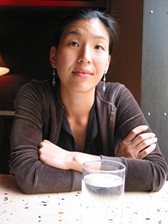Ai-jen Poo
 Want to know how to build a movement for the 21st century? Just ask Ai-jen Poo.
Want to know how to build a movement for the 21st century? Just ask Ai-jen Poo.
As Lead Organizer and Founder of Ms. Foundation grantee Domestic Workers United (DWU), Poo works daily to promote justice for the more than 200,000 women—most of them women of color— doing domestic work in the greater New York Metropolitan area. By supporting political action, community activism, and educating workers about their rights, DWU strives to create a new paradigm for how we value work in
Founded in April of 2000, DWU was launched as part of the Women Workers Project of the Committee Against Anti-Asian Violence (CAAAV) and Andolan: Organizing South Asian Workers. Poo, whose feminist activism took root in college, joined CAAAV as a member in 1995; by 1996 she was on staff, organizing Asian immigrant women working in various low wage service industries, eventually focusing on domestic workers.
As these women joined forces, they quickly realized effecting real change would require a broad base of support from domestic workers of all ethnicities. “The domestic workers who were already involved said, ‘This is not a question that affects Asian workers alone. We really need to organize as a workforce to build our power as a workforce and to raise the level of respect for the work we do,’” Poo recalls. “So they went out and started doing outreach to the women in the parks and in the playgrounds who were from the Caribbean, from Latin America, from
Today, DWU boasts membership of more than 1,300 domestic workers, working together to bring meaningful recognition and labor standards to this crucial but often ignored segment of our economy. “Domestic workers are one of only two workforces that have been excluded from the right to collectively bargain,” Poo points out. “Whether it’s because this work is traditionally seen as women’s work or whether it’s because this work has historically been done by immigrant women or women of color, it’s somehow been okay to exclude domestic workers from every major labor protection to date.”
And that lack of protection, Poo says, creates extreme vulnerability for the domestic workforce: “There are no standards here for domestic workers, leaving them at the absolute whim of their employers. If you happen to find an employer who’s socially conscious about workers rights and about their own responsibilities as a domestic employer, then you might earn a living wage and maybe get some vacation time. But the vast majority of workers remain very vulnerable to abuse.”
DWU has made it its mission to change that reality. In 2002 the organization successfully petitioned for legislation that would hold employment agencies responsible for informing both employers and workers of employee rights. And in March of 2005, DWU’s work led to the introduction of a Domestic Workers Bill of Rights in the
Despite all she has accomplished in her organization’s short history, Poo isn’t anywhere near done yet. “We need much more organization at a grassroots level to build a broad-based mass movement across communities, across sectors, in the interests of poor and working people,” she says. “Then, and only then, will we be able to put into place policies that really are about the interests of our families, of our communities, that are about respecting all forms of work, particularly women’s work, and about human rights and dignity for all.”
And it’s the Ms. Foundation, Poo says, that has the right recipe for bringing this change about. “Too often, the people doing policy advocacy are not the people most directly impacted by the policies themselves,” she reports. “But we feel it’s important that the people who are most directly impacted are at the table at all times. The Ms. Foundation gets that. They really promote the leadership and the vision of working class women of color in the broader social justice movement. That’s a very special thing.”
Go back to The Honorees

 Home
Home